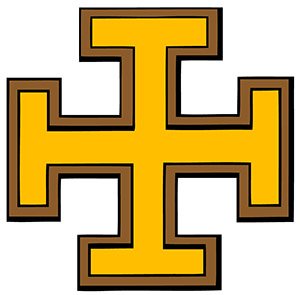
Consistory
The Consistory Degrees (31°–32°) are very different from all the preceding degrees. They attempt to illustrate the creation of the ideal balance between the spiritual and the temporal; the quest for self-examination and empowerment which completes the process.
The Consistory of Masters of the Royal Secret (31º-32º) symbol is a Teutonic cross of gold with arms frosted; in the center are the Roman numerals XXXII, surrounded by a green wreath, without other devices or ornamentation. It symbolizes the crowned summit of chivalric virtues. Suspended from a white ribbon, this symbol also serves as the membership jewel of a 32º Master of the Royal Secret.
The Degrees of the Consistory
31° – Inspector Inquisitor
The central teaching of this degree is justice. To be free, a Mason must begin by passing judgment on himself. He presents himself for examination. By acting honestly in first giving judgment on himself within the principles of justice and equity, it should not be doubted when he shall do the same to his brothers. The brother who finds mercy in himself, who has not been too lenient towards himself, or punished himself too severely, can also judge his brothers. In so doing, he can be certain that he has not acted contrary to his former obligations. He has freed himself.
32° – Master of the Royal Secret
This degree teaches many lessons, but the mystery concealed is that man is a creature of free will and capable of recreating himself. If he accomplishes this goal, he will attain a genuine power that can shake the limits of science, surpass the problems of this earth, decipher the secrets of space, surpass the limits of ceremony and catechism, and attain genuine enlightenment; a gnosis which is the foundation of all religions. He will also surpass the narrow views of interest in the area of morals, and will comprehend a genuine virtue that transcends his own interest. Thus, it will become his nature to help his fellow men, and, in so doing, he will discover the divine light within which brings true freedom of thought, freedom of conscience, and freedom of culture.



